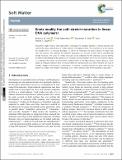Knots modify the coil–stretch transition in linear DNA polymers
Author(s)
Narsimhan, Vivek; Soh, Beatrice W; Klotz, Alexander; Doyle, Patrick S
Downloadc7sm02195j.pdf (4.367Mb)
PUBLISHER_CC
Publisher with Creative Commons License
Creative Commons Attribution
Terms of use
Metadata
Show full item recordAbstract
We perform single-molecule DNA experiments to investigate the relaxation dynamics of knotted polymers and examine the steady-state behavior of knotted polymers in elongational fields. The occurrence of a knot reduces the relaxation time of a molecule and leads to a shift in the molecule's coil-stretch transition to larger strain rates. We measure chain extension and extension fluctuations as a function of strain rate for unknotted and knotted molecules. The curves for knotted molecules can be collapsed onto the unknotted curves by defining an effective Weissenberg number based on the measured knotted relaxation time in the low extension regime, or a relaxation time based on Rouse/Zimm scaling theories in the high extension regime. Because a knot reduces a molecule's relaxation time, we observe that knot untying near the coil-stretch transition can result in dramatic changes in the molecule's conformation. For example, a knotted molecule at a given strain rate can experience a stretch-coil transition, followed by a coil-stretch transition, after the knot partially or fully unties.
Date issued
2018-02Department
Massachusetts Institute of Technology. Department of Chemical EngineeringJournal
Soft Matter
Publisher
Royal Society of Chemistry (RSC)
Citation
Soh, Beatrice W. et al. “Knots Modify the Coil–stretch Transition in Linear DNA Polymers.” Soft Matter 14, 9 (2018): 1689–1698 © 2018 Royal Society of Chemistry
Version: Final published version
ISSN
1744-683X
1744-6848